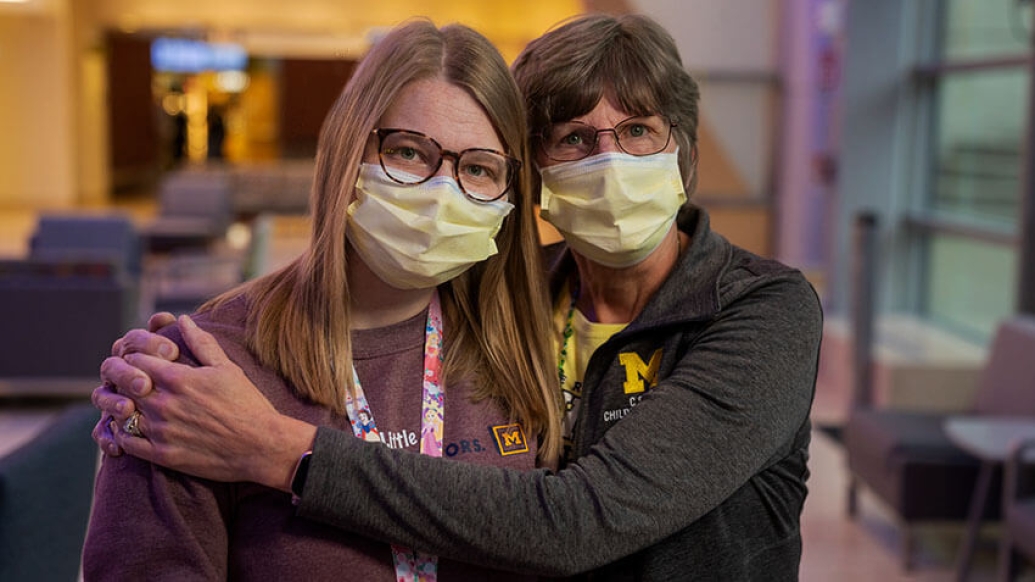During the lengthy hospital stays that Ann Laho’s daughter endured, one nurse’s compassion inspired the mother-daughter pair to pursue the profession and help patients the same way she helped their family
12:50 PM
Author |

They say there's a real science behind "a mother's intuition" and Ann Laho, a mother of seven, can attest to that gut feeling you get when something's wrong with your child.
That feeling led Laho to turn to University of Michigan Health C.S. Mott Children's Hospital where her infant Taryn would, in fact, be diagnosed with a rare gastrointestinal disease.
Laho's long stays at the hospital for the innumerable amount of procedures and surgeries her daughter would undergo resulted in the formation of relationships with different hospital staff that cared for their family. One staff member in particular, a nurse named Martha, inspired Laho to go to nursing school and work at the very hospital her daughter received treatments at for so many years.
MORE FROM MICHIGAN: Sign up for our weekly newsletter
Now, at 25 years old, Taryn Heinonen works with her mother at Mott, helping children cope with life changing diagnoses like the one she received as a newborn.
In honor of Nurses Week, Laho, Heinonen and the pediatric gastroenterologist who cared for them, Chris J. Dickinson, M.D., reflect on this unique mother-daughter journey into nursing and what makes the profession so rewarding.
Living with a new diagnosis
Since birth, Laho, a stay-at-home mom, noticed her infant Taryn couldn't stool on her own.
"She cried all the time and I could tell she was in pain," Laho recalled. "She hardly slept."
This wasn't her first rodeo, though, as one of her other children had similar problems when they were born. At that time, the family's pediatrician told Laho to switch from breast milk to formula. The switch didn't work for Taryn, which prompted the visit to see Dickinson.
When Laho met Dickinson, he was a junior faculty member in Mott's gastrointestinal clinic.
"I picked up Taryn's chart and read that the chief complaint was stooling problems. I automatically thought this was a nervous, first-time mom who I'd just have to discuss normal bowel movements in infants with…that it was probably nothing that required a gastrointestinal specialist," Dickinson said. "So, I entered the room biased."
But Dickinson walked into the room and noticed Laho holding Taryn with two other toddlers at her feet. Without breaking eye contact with Dickinson, she gave the children a subtle and calm command to stay away from the electrical outlet. The toddlers immediately obliged. He quickly realized Laho wasn't a nervous, first-time mom but actually a nervous, super-mom with potentially more legitimate, informed concerns.
"I remember she couldn't easily describe what was wrong with Taryn, but she just knew something was different based on raising all of her other kids," Dickinson said.
A rectal biopsy was ordered and Dickinson discovered a rare issue with the nerves in Taryn's colon: the only case of the condition he'd ever seen up to that point in his career. The diagnosis was Hirschsprung disease, which prohibits the passing of stool and requires surgery to remove the affected bowel. The intestine that remains often has bouts of bacterial overgrowth, which are treated with IV antibiotics.
Taryn had seven major surgeries before she was 1-year-old, so the family was at Mott often, sometimes for weeks at a time.
"It felt like we lived there," Laho recalled. "There were so many admissions for abdominal surgeries, inflammation in the gastrointestinal tract, complications from some of the surgeries, blockages due to adhesions, etc."
But one nurse, Martha, made the hard days feel more tolerable.
"Nurses are amazing in that they can walk in each day and almost completely dictate the kind of day the patient will have. Martha made our days better," Laho said. "She took us under her wing like she did with all the other patients and their families. When I decided to go to nursing school, I wanted to tailor my practice after her."
After many years of lengthy hospital stays with Taryn, Laho went to nursing school when her daughter was 7 years old and the health issues appeared to subside for a while.
Eventually, though, the gastrointestinal pains would return, and Taryn's bowel completely stopped working. Her small intestine didn't want to play the part or do the job of her large intestine that was removed, so she kept succumbing to bacterial overgrowth and subsequent sickness.
"Taryn was older now, though, so I didn't want to make health decisions for her," Laho said. "One of the only options left that we were presented with was getting a permanent ostomy."
Taryn, now 16 years old, tried to wrap her head around this procedure that would result in a drastically different, permanent "normal" for her. It wasn't until she was 18 when Taryn graduated high school that she realized the only way she could pursue her dreams of becoming a nurse was to make a change for the better.
At the same time, she met a man (who would later become her husband), and he encouraged her to go through with getting the ostomy if it would make her feel better. With the full support of her family and boyfriend, she was able to commit to this lifestyle change and schedule the surgery in August 2015. To this day she says it was still the best decision and the right timing for her.
"My parents never let my medical condition define me. Growing up, they always reminded me that I was a girl whose favorite color was pink, whose best friend was Raya, who had a dog named Bella, who was awesome at math, and who happened to have Hirschsprung disease," Taryn Heinonen said. "Now, as a nurse myself, I try hard to help my patients see this in themselves. They don't have to be defined by their medical diagnosis. They can have rich, full personalities and interests outside of their conditions."
Being brave isn't always being big and loud. Sometimes being brave is small and quiet, and crying when you need to.
Coming full circle
When Laho graduated from nursing school, she applied at Mott as a pediatric nurse. She was called by a nurse recruiter and when she arrived on-site for her interview, she realized that the job opening was on the floor where Taryn received care.
"I mentioned that it was one of the nurses on that exact floor, Martha, that inspired me to go into nursing," Laho said. "When I got the job, I actually got to work with Martha for several years. It was an experience that really came full circle."
"You can imagine how happy I was to see Ann on the gastrointestinal floor working as a nurse," Dickinson said. "It's amazing that she went to nursing school while raising all of her kids. I knew she'd be great, especially after her own personal experience with Taryn. And that was proven to be true."
Taryn Heinonen grew up to be a pediatric nurse, inspired to help children with new, life-altering diagnoses and help them manage all the emotions that can come with such overwhelming news. Now, at 25 years old, Heinonen works at Mott alongside her mother.
"It's been a challenge, balancing my own health and caring for patients," Heinonen said. "But even if you have million things to do or a million other things on your mind, the patient is the only thing that matters when you're with them."
Laho echoed this sentiment, reflecting on how nurses can completely turn a patient's day around.
"It's the best part of nursing, feeling like you made someone's day," Laho said. "It's an exhausting job, of course, but I try to leave my home life at the door and come in being the nurse I want to be. I want to be a nurse that cares and gives it my all."
The dynamic mother-daughter duo offers different perspectives in their work, as Laho can empathize with the stressed-out parent being an advocate for their child and Heinonen can understand how it feels to be submerged with a chronic diagnosis and the difficulties in embracing yourself for exactly who you are.
"When you receive a diagnosis like the one I did, you often get told that you're so brave," Heinonen said. "But I tell patients that brave people can still be sad. Being brave isn't about being big and loud. Sometimes being brave is small and quiet, and crying when you need to. That's important."
Like Podcasts? Add the Michigan Medicine News Break on iTunes or anywhere you listen to podcasts.

Explore a variety of healthcare news & stories by visiting the Health Lab home page for more articles.

Department of Communication at Michigan Medicine
Want top health & research news weekly? Sign up for Health Lab’s newsletters today!





